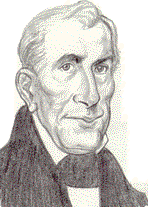Champ at Tip'canoe

An affable, charming patrician planter, William Henry Harrison (born on this day in 1773 at Berkeley Plantation, Charles City County, Virginia) saw his greatest success as a ruthless soldier. Son of a signer of the Declaration of Independence (Benjamin Harrison, 1726-1791, known as the "Falstaff of Congress") and grandfather to the 23rd U.S. President (Benjamin Harrison, 1833-1901), Harrison studied medicine for a time with Dr. Benjamin Rush at the University of Pennsylvania before joining the Army in 1793. He was assigned as aide-de-camp to General "Mad" Anthony Wayne, and saw action with Wayne during the Indian Wars in the Northwest Territory.
Resigning from the Army in 1798, Harrison began a career of service in the Northwest Territory: President John Adams appointed him secretary of the Territory and later governor, and he served a stint as delegate from the Territory to Congress. As a congressional delegate, he collaborated with Albert Gallatin on the Harrison Land Act of 1800, which opened the Northwest Territory to settlers by prompting the government to sell smaller, affordable tracts of land on easy credit terms. As governor, he "negotiated" several treaties with Indians (bribing them with alcohol and petty cash) to insure that settlers in Indiana and Illinois would not be molested by Indians in the region.
The Shawnees, led by Tecumseh and his brother The Prophet, would not bribed, however, so Harrison prepared for a war with the Shawnees by assembling 950 men under his command. On November 7, 1811, Harrison and his troops were ambushed near Tippecanoe Creek by the Shawnees, and although taken by surprise, Harrison rallied his troops and won the bloody Battle of Tippecanoe. After Harrison ordered the burning of a Shawnee settlement known as Prophetstown, which demoralized Tecumseh's followers, there was no further organized opposition to white settlement in the Indiana area. Harrison went on to fight in the War of 1812 (recapturing Detroit from the British), served as a congressman and senator from Ohio and as Minister to Colombia, and finally retired to his farm at North Bend, Ohio, serving as the local county clerk of courts for a time.
In 1836, he was nominated by a Pennsylvania Whig convention to take on Andrew Jackson's hand-picked successor, Martin Van Buren, in the presidential election; but the Whigs were disorganized, and other state conventions nominated Daniel Webster and Hugh L. White to face Van Buren, who won the 1836 election easily. Four years later, the Whigs met again in Pennsylvania and this time united behind Harrison to run against Van Buren, choosing John Tyler (who was born just down the road from the Harrison estate in Charles City County, Virginia) as his running mate.
The campaign of 1840 was probably the first modern presidential campaign -- in the sense that it sought to appeal to popular tastes and attempted to shift the debate to style rather than substance -- complete with songs, rallies and hoopla. Whigs portrayed Harrison as the candidate of the frontier, a man of simple virtues and tastes (a "hard cider" man), in contrast to Van Buren's fussy European manners. While rolling a huge paper ball through towns from Kentucky to Baltimore, pro-Harrison electioneers coined the famous campaign motto, "Tippecanoe and Tyler, too," a reference to Harrison's famous war record.
Harrison handily beat the unpopular incumbent, 234 electoral votes to 60. At 68, Harrison was the oldest man elected president until Ronald Reagan in 1980, and he still holds the record for delivering the longest inaugural address at 1 hour and 40 minutes. That bit of excess may have been his downfall: Harrison refused to wear a hat and coat when he delivered the speech and caught a chill which developed into a fatal case of pneumonia, making Harrison the first president to die in office.
Originally buried in the Congressional Cemetery in Washington, Harrison's body was transported to a spot overlooking the Ohio River on his property at North Bend. The site has continually been beset by vandals and graverobbers (see my previous post regarding the graverobbing incident involving Harrison's son, John Harrison), and even today there seems to be some squabbling among local organizations as to who should care for Harrison's tomb.
Categories: American-Politicians, US-Presidents, Presidential-Campaigns





0 Comments:
Post a Comment
Subscribe to Post Comments [Atom]
<< Home